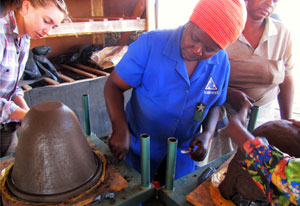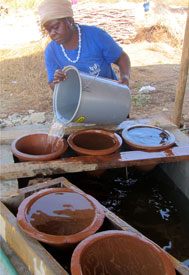An international research collaboration develops clay water filters to reduce diarrheal disease
January / February 2013 | Volume 12, Issue 1
By Cathy Kristiansen
With a simple clay water filter, researchers hope to prevent diarrheal diseases in children, HIV-positive adults and others in the remote Limpopo area of South Africa. The filters, made for household water containers by a local women's cooperative, are intended to remove or kill most pathogens that cause diarrhea, the region's second biggest killer after HIV/AIDS.
The water filter plan is part of an extensive collaboration on global health research facilitated by Fogarty Framework grants since 2005, between the University of Virginia (UVA) and the Limpopo-based University of Venda (Univen), a former black homeland university. The Framework program, now in its third iteration, brings together scientists from different disciplines to develop innovative solutions for complex health problems in disadvantaged populations. Overseas fellows visit the U.S. to further their training and U.S. researchers visit the developing country, where both groups gain practical experience in global health research. The universities and faculty benefit from the increased capacity, as well as teaching and research opportunities.

Photo by Dr. James Smith
U.S. and South African researchers are collaborating
on a clay water filter project to reduce diarrheal diseases,
the second biggest killer in this rural area.
"This water filter project is a prime example of how a multidisciplinary focus on an important health concern can be so synergistic in the context of the community, the university there and the university here," said UVA's Dr. Richard L. Guerrant, principal investigator. Guerrant is also engaged in an NIH effort funded by the Bill & Melinda Gates Foundation to study linkages in Limpopo between diarrheal diseases, malnutrition and cognitive development.
The water filter venture, although relatively small, is complex. To arrive at the point where villagers consistently filter their drinking water requires much more than handing over ready-made gadgets with instructions. At the outset, researchers consulted the community about their needs, tested the water quality, selected an appropriate filter, assessed its acceptability and effectiveness, and planned how to produce it locally in a sustainable way.
The endeavor required expertise in numerous fields aside from public health, said UVA researcher Dr. Rebecca Dillingham. She led the project with Dr. James Smith, UVA professor of civil engineering, who previously tested ceramic filters in Guatemala. The team needed microbiologists, for instance, to assess how well the filter's silver nanoparticles kill pathogens; engineers to optimize the filter composition and design; anthropologists to integrate the community's perspective; and architects to design a site plan for the factory. The team also consulted potters with filter experience to give technical help, landscape architects to select fast-growing trees for kiln firewood, and business experts to determine a viable filter price and sales outlets. Univen and UVA students have collaborated on each aspect of the project.

Photo by Dr. James Smith
The clay water filters, for household
water containers, are made by a
local women's cooperative.
Over the past decades, UVA has hosted Univen trainees who have advanced their studies in disciplines ranging from molecular diagnostics to genetic epidemiology to clinical trial design, and who have built their skills in scientific writing, responsible conduct of research and other related topics. The trainees returned home to help Univen develop as a center of excellence for clinical and genetic epidemiology studies. In addition, the involvement of UVA researchers and students in field studies with South African scientists generates valuable experience and builds ties that will facilitate sustained, productive research partnerships.
By locally producing the filters, which last about two years, the project will generate work and income in this area of high unemployment. Once in use, the team plans to monitor the filters' impact on diarrheal rates. Further projects could blossom out of this success, Guerrant said. "The water project promises to show us a model for ways that we can learn in collaboration with brilliant colleagues in an endemic area with a huge set of health problems."
More Information
To view Adobe PDF files,
download current, free accessible plug-ins from Adobe's website.